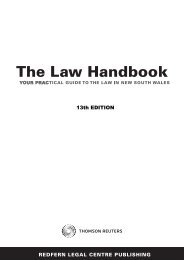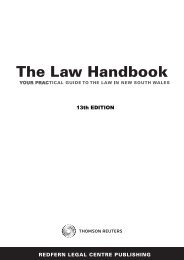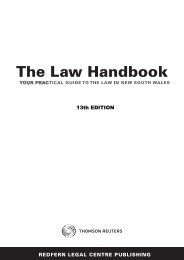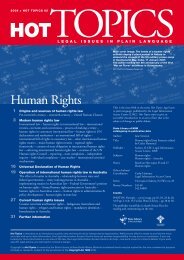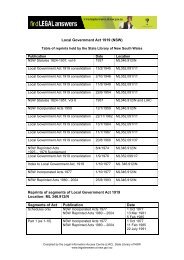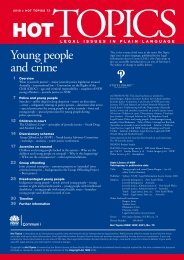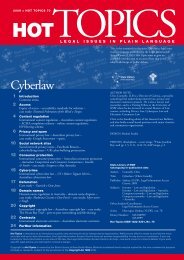Guide to termination and unfair dismissal rights of - Legal ...
Guide to termination and unfair dismissal rights of - Legal ...
Guide to termination and unfair dismissal rights of - Legal ...
- No tags were found...
You also want an ePaper? Increase the reach of your titles
YUMPU automatically turns print PDFs into web optimized ePapers that Google loves.
about informing himself or herself <strong>of</strong> relevant matters. On this basis the FWA Member should make allowancesfor the fact that an employee (for various reasons) may not be as able <strong>to</strong> present their case as an employer withhuman resources managers who have knowledge <strong>and</strong> experience <strong>of</strong> employment matters in FWA.A hearing is an alternative <strong>to</strong> a conference. The FWA Member may decide at any time <strong>to</strong> hold a hearing which willbe a more formal process. The FWA Member may decide <strong>to</strong> hold a hearing in relation <strong>to</strong> some parts <strong>of</strong> the claimor the entire claim.The FWA Member must take in<strong>to</strong> account the views <strong>of</strong> the parties about whether or not a hearing should takeplace. The FWA Member must also take in<strong>to</strong> account whether or not a hearing would be the most effective <strong>and</strong>efficient way <strong>of</strong> dealing with the claim.The FWAct requires that a FWA Member conduct a conference or hold a hearing where there is a disputebetween the parties about the facts <strong>of</strong> the case. 88The strict rules, which <strong>of</strong>ten operate in courts do not apply <strong>to</strong> FWA in conferences <strong>and</strong> hearings. The FWActmakes it clear that:• y FWA may inform itself in relation <strong>to</strong> a fact or matter in any manner that FWA considers appropriate; 89<strong>and</strong>90• y FWA is not bound by the strict rules <strong>of</strong> evidence <strong>and</strong> procedure.Having said this, FWA is required <strong>to</strong> follow the FWAct <strong>and</strong> the accompanying Fair Work Regulations <strong>and</strong> theFair Work Australia Rules. It is also implied that FWA must be fair <strong>to</strong> all <strong>of</strong> the parties in the application <strong>of</strong> itsprocedures <strong>and</strong> processes. For example, in an <strong>unfair</strong> <strong>dismissal</strong> matter both the employee <strong>and</strong> the employer mustbe given a fair opportunity <strong>to</strong> present their case.The role <strong>of</strong> lawyers <strong>and</strong> other industrial advocatesArguably the procedures relating <strong>to</strong> <strong>unfair</strong> <strong>dismissal</strong> claims under the FWAct were designed so employees <strong>and</strong>employers can represent themselves. However lawyers, industrial advocates <strong>and</strong> union <strong>of</strong>ficials <strong>of</strong>ten representparties in <strong>unfair</strong> <strong>dismissal</strong> claims. There are a variety <strong>of</strong> views about the involvement <strong>of</strong> lawyers <strong>and</strong> otherrepresentatives <strong>and</strong> the role they do or should play.It is sometimes appropriate for employees <strong>to</strong> be represented where there is a significant difference between theemployee’s <strong>and</strong> the employer’s capacity <strong>to</strong> present <strong>and</strong> argue their case. This is especially so where mediumsized or large employers have experienced human resources <strong>and</strong> industrial relations staff who can present theemployer’s case with skill <strong>and</strong> confidence.At a conference or hearing conducted by a FWA Member it is necessary for any lawyers or “paid agents” (usuallyindustrial advocates) be granted permission <strong>to</strong> represent their client. 91 There can be consequences involvingorders that lawyers <strong>and</strong> paid agents pay a party’s legal costs where the case they present has no reasonableprospects <strong>of</strong> success. 92 There can also be a legal costs order where the unreasonable conduct by a lawyer orpaid agent causes the other side <strong>to</strong> incur unnecessary legal costs. 93The payment <strong>of</strong> legal costs will only be ordered on the application <strong>of</strong> the party who seeks the payment <strong>of</strong> theirlegal costs. The application must be made within 14 days <strong>of</strong> the de<strong>termination</strong> or discontinuance <strong>of</strong> the claim. 94ComplianceRefusal or failure <strong>of</strong> a party <strong>to</strong> obey an order made under the <strong>unfair</strong> <strong>dismissal</strong> laws may result in a pecuniarypenalty (fine) being imposed on the party. 95 The Federal Court <strong>of</strong> Australia or the Federal Magistrates Court mayimpose the penalty. 96 Presently (as <strong>of</strong> January 2011) a maximum fine <strong>of</strong> $6,600 may be imposed on an individualperson <strong>and</strong> a maximum fine <strong>of</strong> $33,000 may be imposed on a corporation.16





